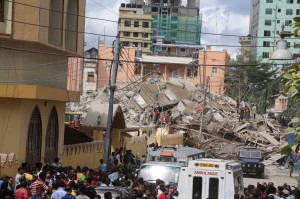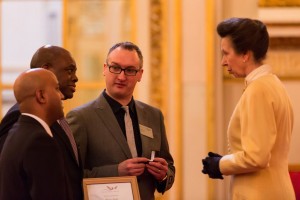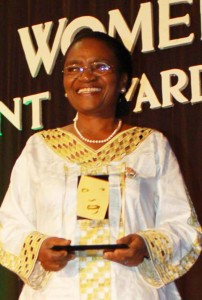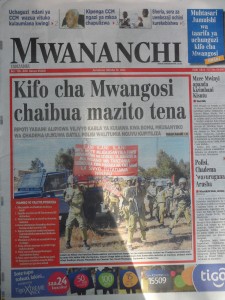by Samia Khatun
In August 2012 I quit my well-paid full-time research job to volunteer with the Voluntary Services Overseas International Citizen Service (VSO ICS) programme. Practically every person asked me the same question: “Are you mad – in this economic climate?” and before departing this question replayed over and over again in the back of my mind. Now I have the answer to this question. “No, I am not mad and would do it all over again” – and here is why.
Having completed my Masters in International Development, I decided to pursue a career in Development Research which took me from working for a small grant awarding trust to a large international research consultancy. Working from the luxury of a London office, I felt disconnected and far removed from the realities of international development, which is why I decided to volunteer.
I believe that it was fate that I ended up going to Tanzania. I applied online not knowing which country I would be going to if my application was successful. A few days later, I was invited to an assessment day, which included a group task and an individual interview. The first task of the day was to imagine that there was a world map on the floor and each applicant was asked to stand anywhere on the map and explain their choice of country. I stood in Tanzania, and when probed as to the reason, I replied that I would like to go there sometime.
At the end of the assessment day the coordinator told us that she would be in touch and that they had spaces in Nepal, Nigeria and Tanzania. You can’t imagine my excitement hearing that Tanzania was an option, and when I was later informed that I had been placed in the Tanzania programme, I could not believe my luck.
The scheme, funded by DfID, is aimed at 18-25 year olds and groups of volunteers are placed in a community for three months, living in host homes and working in cross-cultural counterpart pairs. I found out I would be travelling to Kamachumu, a rural village in Muleba district in Kagera region in north west Tanzania. If you google Kamachumu you don’t get a lot of information, and I thought “what have I let myself in for?” The nearest town, Bukoba, is one and a half hours away on the daladala (I will not be complaining about overcrowding on the British underground again!).
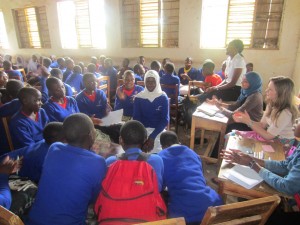
Samia (second from right wearing headscarf) with fellow VSO ICS volunteers Flora John Moshi and Catriona Mckayand at a sexual and reproductive health session at Rutabo Secondary School
My host home was relatively small with just my host mother and father, as their sons live and work in Dar es Salam. Other volunteers were placed in host homes with up to four generations living under one roof. My host mother was keen for us to have a full experience and involved us in family life as much as possible; I experienced the birth of a newborn baby, a visit to see grandparents and the death of a family friend.
During the placement we worked with a grassroots NGO called KAVIPE (Kamachumu Vision for Poverty Eradication) on different projects including agriculture, youth, environment, gender and health. I was placed on the health programme. The two main goals of the health team were: (1) to reduce stigma associated with HIV/AIDs and (2) to increase awareness of sound sexual and reproductive health practice amongst women. Kamachumu is home to Ndolage Hospital where the first HIV/AIDs cases in Tanzania were discovered in 1983.
The experience was not without its challenges. For example, I don’t think any volunteer will ever get use to the chorus of “Mzungu” (white person/ foreigner) every time you take a step out of the comfort of your host home, nor the relaxed attitude to time keeping (a big issue for us Brits who are sticklers for ensuring meetings start in a timely fashion) and not knowing the local language, but these are what you would call minor concerns in the grand scheme of things.
Another challenge for me personally was the food, the staple food in Kamachumu is bananas, we would have fried bananas at breakfast, matoke (steamed green bananas) for lunch, grilled bananas at tea and endless sweet bananas as a treat between meals! Whilst I grumbled about the amount of bananas, the community was worried about Banana Xanthomonus Wilt (BXW) more commonly referred to as ‘banana disease’, which threatens the food security of the region and the livelihoods/income of many farmers. There is currently no chemical or biological treatment or cure for the disease, which has left researchers puzzled. I soon stopped the grumbling and began to have a new found appreciation for bananas.
Despite the challenges, the particular skills that I will take away include working cross-culturally, team work, critical thinking, adaptability, project planning and delivery. I learnt so much about the different types of development, from international development to community development, but more importantly personal development. I was able to experience the beauty that is Tanzania with its luscious greenery, marvellous array of colourful birds, and vibrant culture and make plenty of lifelong friends. I believe this experience has given me a better insight into what it means to really work in international development and will provide me with a clearer perspective on what we are actually hoping to achieve.
Prior to joining the scheme, I wondered whether this would be a life-changing experience. To sum up, yes, it has definitely opened my eyes and I think that all young people in the UK would benefit from taking part and should be encouraged to do so – not just to improve their CVs by enhancing their skills but also to experience something that will stay with them forever. Whilst I didn’t get to see the ndovu (elephants), twiga (giraffes) and simba (lions) of the Serengeti, it was a wholly worthwhile experience and one that I would do again in a flash.
Samia Khatun holds an MSc in Political Economy of Development from SOAS, a BSc Honours degree in Politics and Economics from Brunel University, and is a Trustee of the Hilden Charitable Fund. Prior to volunteering in Tanzania, she worked at InterMedia, a C4D research consultancy with clients including the Bill & Melinda Gates Foundation, Deutsche Welle and BBC Media Action Swahili.

